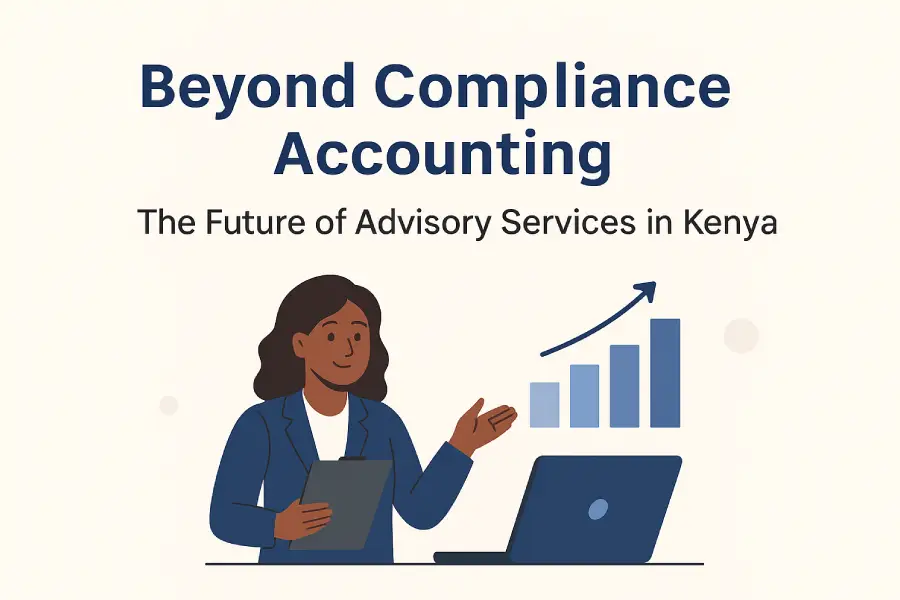
Introduction
The law reinforces the essential role of accountants in society. In Kenya and many other jurisdictions, financial audits are mandatory for both public and private entities. However, before an audit is conducted, accounting records and financial statements must be prepared—a responsibility entrusted to professional accountants.
As long as financial reporting laws exist, the work of accountants and auditors remains indispensable. At this level, accounting is defined by legal frameworks and international standards, making it highly structured. This traditional form of accounting, focused primarily on regulatory compliance, can be described as Compliance Accounting.
Yet, the profession has grown far beyond compliance. Accountants now deliver value-added services that go beyond audits and statutory reporting, covering areas such as tax advisory, financial consultancy, and business strategy.
Compliance Accounting: The Traditional Role
Regulatory bodies generally prefer standardized financial reporting to ensure transparency and accountability. As such, accountants must prepare statements that conform to prescribed formats, regardless of stakeholder expectations. This ensures consistency, but it also restricts the flexibility of accountants to provide deeper insights.
Compliance accounting includes:
- Audit and assurance services
- Bookkeeping and payroll management
- Preparation of tax returns
- Statutory financial reporting
However, research shows that firms relying heavily on audit and compliance services are becoming less profitable. For example, a 2021 Thompson Reuters Institute survey of 315 U.S. audit firms found that those depending more on audits were less profitable than firms focusing on advisory services. Clients increasingly see audits as a necessity rather than a strategic value-add.
The Rise of Advisory Services
Globally, advisory services are overtaking audit as the main revenue driver for accounting firms. In 1977, audit revenues made up 70% of leading firms’ income. By 2023, however, advisory revenues surpassed audit and assurance across all Big Four firms (PwC, Deloitte, KPMG, EY).
The American Institute of Certified Public Accountants (AICPA) defines advisory services as helping clients make informed decisions by providing findings, conclusions, and recommendations.
In Kenya, a similar trend is visible. Data from the Institute of Certified Public Accountants of Kenya (ICPAK) shows that non-audit licenses are three times more popular than audit-focused licenses. This demonstrates a shift toward advisory and consulting services in the Kenyan market.
Types of Advisory Services Offered by Accountants
Accountants now apply their business and financial expertise to deliver solutions tailored to modern challenges. Common advisory areas include:
Tax planning and compliance strategies
- Technology consulting (ERP systems, automation, AI adoption)
- Financial forecasting and analytics
- Risk and compliance management
- Transaction advisory and due diligence
- Forensic accounting and fraud investigations
- Corporate restructuring and governance advisory
- Climate consulting and sustainability reporting
- Technology Consulting
While accountants may not be IT experts, they understand the end goals of financial systems. They guide businesses in implementing accounting software, process automation, and cloud solutions to improve efficiency and transparency.
Data Storytelling
With the explosion of big data and AI, accountants are becoming the interpreters of financial and non-financial data. They provide analytics, dashboards, and insights that help businesses make informed decisions.
Climate Consulting
As sustainability takes center stage, accountants are playing a role in carbon accounting and environmental reporting. Global firms such as Deloitte and PwC are investing billions into climate advisory. Kenyan firms, too, have an opportunity to provide green finance and sustainability consulting.
The Future of the Accounting Profession in Kenya
The future of accounting lies in advisory services, innovation, and global competitiveness. Unlike audits and tax returns, which are jurisdiction-specific, advisory services can be exported globally. This opens opportunities for Kenyan firms to serve international clients.
However, the key question remains:
👉 Can Kenyan accounting firms compete on the global stage without the regulatory protection of compliance accounting?
The answer lies in embracing technology, specialization, and strategic advisory roles that provide greater value to businesses beyond traditional compliance.
Conclusion
The accounting profession is evolving rapidly. Compliance accounting remains important, but its dominance is declining. The future belongs to firms that embrace advisory services, digital transformation, and sustainability consulting.
For Kenyan accountants, this shift represents not just a challenge, but also a tremendous opportunity to shape the future of businesses locally and globally.
